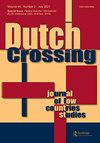The Passive as an Impersonalisation Strategy in Afrikaans and Dutch: A Corpus Investigation
IF 0.4
3区 历史学
Q1 HISTORY
Dutch Crossing-Journal of Low Countries Studies
Pub Date : 2021-05-04
DOI:10.1080/03096564.2021.1906598
引用次数: 0
Abstract
ABSTRACT Although a lot of research has been done on the use of pronouns to express impersonal meaning in West Germanic languages, relatively little is known about the use of other possible impersonalization strategies. This article therefore examines the agentless passive as a possible impersonalizing strategy in Afrikaans and Dutch. On the basis of corpus data, we show that the agentless passive is a productive strategy for impersonalization in both Afrikaans and Dutch –in that it is used in the entire range of impersonal contexts. However, it is more typically employed for corporate contexts and existential contexts where the subject is vague and number-neutral. Some variation in the use of the agentless passive in different genres are also seen. On the whole, however, the agentless passives behave very similarly in the two languages as an impersonalizing strategy.南非荷兰语和荷兰语中的被动语态作为非人格化策略:语料库调查
虽然人们对西日耳曼语中代词表达非人格化意义的研究很多,但对其他可能的非人格化策略的研究相对较少。因此,本文探讨无主体被动作为一种可能的非南非荷兰语和荷兰语非人格化策略。在语料库数据的基础上,我们表明无主体被动语态在南非荷兰语和荷兰语中都是一种有效的非人格化策略,因为它在整个非人格化语境中都被使用。然而,它更典型地用于公司语境和存在主义语境,在这些语境中,主题是模糊和数字中立的。在不同体裁中,无主被动语态的使用也有所不同。然而,总的来说,作为一种非人格化策略,无主体被动句在两种语言中的表现非常相似。
本文章由计算机程序翻译,如有差异,请以英文原文为准。
求助全文
约1分钟内获得全文
求助全文

 求助内容:
求助内容: 应助结果提醒方式:
应助结果提醒方式:


